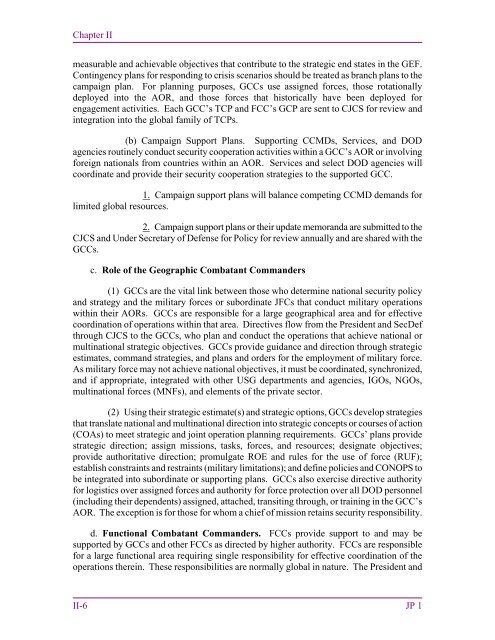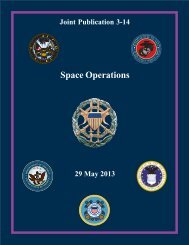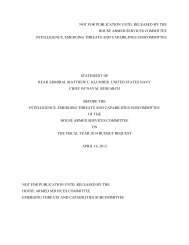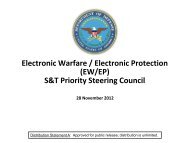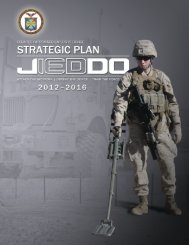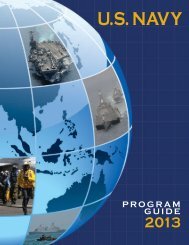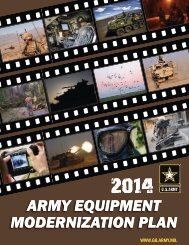JP 1, Doctrine for the Armed Forces of the United States - Defense ...
JP 1, Doctrine for the Armed Forces of the United States - Defense ...
JP 1, Doctrine for the Armed Forces of the United States - Defense ...
You also want an ePaper? Increase the reach of your titles
YUMPU automatically turns print PDFs into web optimized ePapers that Google loves.
Chapter II<br />
measurable and achievable objectives that contribute to <strong>the</strong> strategic end states in <strong>the</strong> GEF.<br />
Contingency plans <strong>for</strong> responding to crisis scenarios should be treated as branch plans to <strong>the</strong><br />
campaign plan. For planning purposes, GCCs use assigned <strong>for</strong>ces, those rotationally<br />
deployed into <strong>the</strong> AOR, and those <strong>for</strong>ces that historically have been deployed <strong>for</strong><br />
engagement activities. Each GCC’s TCP and FCC’s GCP are sent to CJCS <strong>for</strong> review and<br />
integration into <strong>the</strong> global family <strong>of</strong> TCPs.<br />
(b) Campaign Support Plans. Supporting CCMDs, Services, and DOD<br />
agencies routinely conduct security cooperation activities within a GCC’s AOR or involving<br />
<strong>for</strong>eign nationals from countries within an AOR. Services and select DOD agencies will<br />
coordinate and provide <strong>the</strong>ir security cooperation strategies to <strong>the</strong> supported GCC.<br />
1. Campaign support plans will balance competing CCMD demands <strong>for</strong><br />
limited global resources.<br />
2. Campaign support plans or <strong>the</strong>ir update memoranda are submitted to <strong>the</strong><br />
CJCS and Under Secretary <strong>of</strong> <strong>Defense</strong> <strong>for</strong> Policy <strong>for</strong> review annually and are shared with <strong>the</strong><br />
GCCs.<br />
c. Role <strong>of</strong> <strong>the</strong> Geographic Combatant Commanders<br />
(1) GCCs are <strong>the</strong> vital link between those who determine national security policy<br />
and strategy and <strong>the</strong> military <strong>for</strong>ces or subordinate JFCs that conduct military operations<br />
within <strong>the</strong>ir AORs. GCCs are responsible <strong>for</strong> a large geographical area and <strong>for</strong> effective<br />
coordination <strong>of</strong> operations within that area. Directives flow from <strong>the</strong> President and SecDef<br />
through CJCS to <strong>the</strong> GCCs, who plan and conduct <strong>the</strong> operations that achieve national or<br />
multinational strategic objectives. GCCs provide guidance and direction through strategic<br />
estimates, command strategies, and plans and orders <strong>for</strong> <strong>the</strong> employment <strong>of</strong> military <strong>for</strong>ce.<br />
As military <strong>for</strong>ce may not achieve national objectives, it must be coordinated, synchronized,<br />
and if appropriate, integrated with o<strong>the</strong>r USG departments and agencies, IGOs, NGOs,<br />
multinational <strong>for</strong>ces (MNFs), and elements <strong>of</strong> <strong>the</strong> private sector.<br />
(2) Using <strong>the</strong>ir strategic estimate(s) and strategic options, GCCs develop strategies<br />
that translate national and multinational direction into strategic concepts or courses <strong>of</strong> action<br />
(COAs) to meet strategic and joint operation planning requirements. GCCs’ plans provide<br />
strategic direction; assign missions, tasks, <strong>for</strong>ces, and resources; designate objectives;<br />
provide authoritative direction; promulgate ROE and rules <strong>for</strong> <strong>the</strong> use <strong>of</strong> <strong>for</strong>ce (RUF);<br />
establish constraints and restraints (military limitations); and define policies and CONOPS to<br />
be integrated into subordinate or supporting plans. GCCs also exercise directive authority<br />
<strong>for</strong> logistics over assigned <strong>for</strong>ces and authority <strong>for</strong> <strong>for</strong>ce protection over all DOD personnel<br />
(including <strong>the</strong>ir dependents) assigned, attached, transiting through, or training in <strong>the</strong> GCC’s<br />
AOR. The exception is <strong>for</strong> those <strong>for</strong> whom a chief <strong>of</strong> mission retains security responsibility.<br />
d. Functional Combatant Commanders. FCCs provide support to and may be<br />
supported by GCCs and o<strong>the</strong>r FCCs as directed by higher authority. FCCs are responsible<br />
<strong>for</strong> a large functional area requiring single responsibility <strong>for</strong> effective coordination <strong>of</strong> <strong>the</strong><br />
operations <strong>the</strong>rein. These responsibilities are normally global in nature. The President and<br />
II-6 <strong>JP</strong> 1


